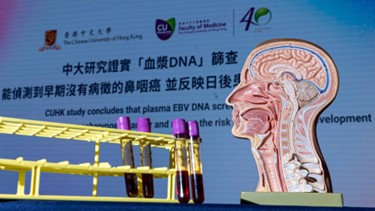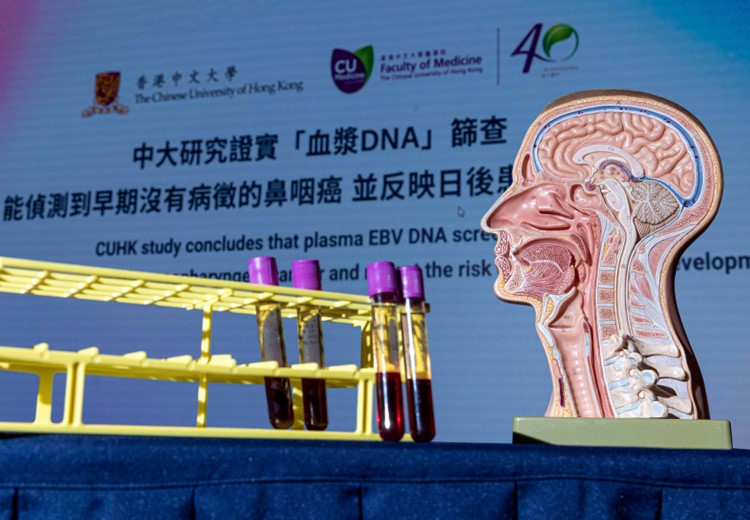Blood test helps spot nasopharyngeal cancer and predict cancer risk

Sponsored by

Sponsored by

A study by CU Medicine shows that plasma EBV DNA screening is effective for the early detection of nasopharyngeal cancer.
A landmark study from CU Medicine has proven that an innovative blood test can help clinicians pick up early signals of nasopharyngeal cancer (NPC), a common form of head and neck cancer. This has the potential to boost early detection and significantly enhance NPC patients’ chances of survival. The study has been published in NEJM Evidence, a publication of the New England Journal of Medicine Group.
NPC affects the upper part of the pharynx, behind the nose. A common type of cancer in Hong Kong and other parts of Southern China, as well as among people with Chinese and Asian ancestry worldwide, it is one of the most aggressive head and neck cancers, and frequently metastasises to distant lymph nodes and organs.
Scanning for signals in the blood
NPC is closely associated with Epstein-Barr virus (EBV) infection, a common virus in humans. In patients with NPC, the cancer cells would release EBV DNA into the blood plasma. Therefore, circulating EBV DNA can be used as a biomarker for detecting NPC. CU Medicine researchers wanted to know whether screening for cancer-derived EBV DNA in blood plasma would aid both early detection of NPC and more accurate assessment of future cancer risk.
From 2013 to 2016, CUHK’s research team tested the blood of 20,000 middle-aged males with no NPC symptoms. Among the 309 subjects who consistently tested positive for EBV DNA, further examinations identified 34 cases of NPC. The cancer-free cases of EBV DNA were considered false positives.
More than 17,000 participants with no cancer identified in the first round underwent a second round of testing three to five years later. This led to two significant findings.
First, the risk of NPC being detected in the second round was about 17 times higher for those who tested persistently positive for EBV in the first round compared to those who did not. Second, about 70% of those who were found to have NPC were still at the early stages (stages I or II) of the disease. By contrast, only 20% of unscreened NPC patients present with early-stage cancer, proving that EBV DNA screening in asymptomatic individuals can lead to earlier detection of NPC.
A powerful preventative tool for doctors
Prof. Dennis Lo, Director of the Li Ka Shing Institute of Health Sciences at CUHK and Scientific Director of Centre for Novostics, known for his landmark discovery of the presence of cell-free fetal DNA in maternal plasma, has been working to apply circulating DNA analysis to the screening of early cancers.
He remarked, ‘Our large-scale prospective study demonstrated that detection of cancer-related DNA changes in a blood test also reflects an increased risk of cancer in the future. In addition to NPC, it is possible that this phenomenon might also be seen for other cancers. In addition to detecting early asymptomatic cancers to improve the survival rate of patients, it can predict the future cancer risk of subjects so that they can take appropriate management measures, such as more frequent follow-up to look for emerging cancers.

The large-scale prospective study demonstrates that detection of cancer-related DNA changes in a blood test also reflects an increased risk of cancer in the future.
The study has profound implications for how clinicians interpret ‘liquid biopsies’, a common blood test used to detect a range of cancers. In addition, researchers believe that this phenomenon might also be seen in other cancers.
The research team was drawn from CUHK’s Li Ka Shing Institute of Health Sciences, State Key Laboratory of Translational Oncology (CUHK), CU Medicine’s Department of Chemical Pathology, Department of Otorhinolaryngology, Head and Neck Surgery, Department of Imaging and Interventional Radiology, The Jockey Club School of Public Health and Primary Care, Department of Clinical Oncology, and the Centre for Novostics at Hong Kong Science Park. The Centre for Novostics is supported by the Hong Kong SAR government’s InnoHK scheme.
Read more:
(July 2023)